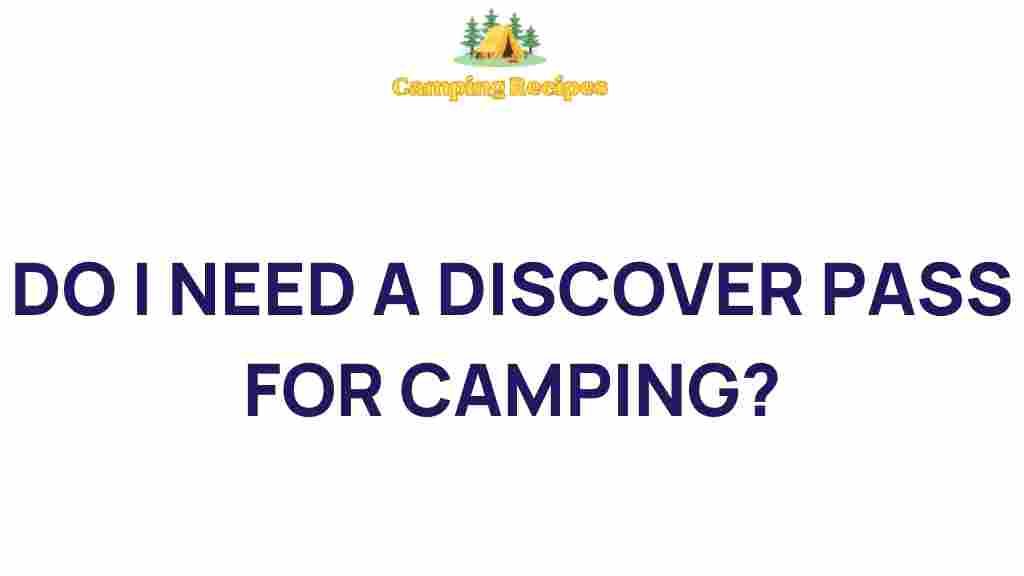Unraveling the Mystery: Do You Really Need a Discover Pass for Camping?
If you’re an outdoor enthusiast, you’ve likely heard about the Discover Pass and its role in camping regulations. But do you really need it? As the popularity of outdoor activities like hiking, camping, and nature trips continues to grow, understanding the various permits and fees associated with recreation access is crucial for adventure planning. In this article, we’ll delve into the details of the Discover Pass, explore its necessity for camping, and provide you with all the information you need to enjoy your outdoor experiences without any hiccups.
What is a Discover Pass?
The Discover Pass is a permit that allows access to Washington State’s parks and recreation lands. It’s mandatory for anyone who wants to park their vehicle in state parks, recreational areas, and certain wildlife areas. The fee collected from the pass goes toward the maintenance and improvement of these outdoor spaces, ensuring that they remain enjoyable for everyone.
Why is the Discover Pass Important?
Having a Discover Pass is essential for several reasons:
- Access to State Parks: Without a Discover Pass, you may not be able to park in state parks, which are prime locations for camping, hiking, and other outdoor activities.
- Support for Maintenance: The fees collected help fund the upkeep of trails, campsites, and facilities, ensuring a better experience for visitors.
- Compliance with Regulations: Using a Discover Pass helps you stay within legal camping regulations, avoiding fines and penalties.
Understanding Camping Regulations
Before heading out for your next adventure, it’s vital to familiarize yourself with the camping regulations that apply to the areas you plan to visit. Here’s what you need to know:
- Permits Required: Depending on where you’re camping, you may need additional permits besides the Discover Pass.
- Site Reservations: Some campgrounds require reservations in advance. Always check the specific campground’s rules.
- Length of Stay: Many campgrounds have limits on how long you can stay, typically ranging from 14 to 30 days.
- Fires and Campfires: Be aware of any restrictions on fires, especially during dry seasons.
- Wildlife Interaction: Respect wildlife regulations to keep both you and the animals safe.
Do You Need a Discover Pass for Camping?
The answer largely depends on where you decide to camp. Here’s a breakdown:
- State Parks: Yes, you need a Discover Pass to park your vehicle in state parks.
- National Parks: A Discover Pass is not valid; you may need a different permit.
- National Forests: Fees and permits vary; check local regulations.
- Private Campgrounds: Typically, a Discover Pass is not required, but there may be site fees.
For a comprehensive list of fees and permits, you can explore the official Washington State Parks website here.
Step-by-Step Process for Obtaining a Discover Pass
If you’ve determined that you need a Discover Pass for your upcoming camping trip, here’s how to obtain one:
- Visit the Official Website: Go to the Washington State Parks website to purchase your pass online.
- Select Your Pass Type: Choose between a one-day pass or an annual pass based on your needs.
- Provide Your Information: Fill out the necessary personal details, including your vehicle information.
- Make Your Payment: Complete your payment using a credit or debit card.
- Print Your Pass: After your purchase, print your pass or download it to your mobile device.
Fees Associated with the Discover Pass
The cost of the Discover Pass can vary based on the type of pass you choose:
- Annual Pass: Typically costs around $30, allowing unlimited access for one year.
- One-Day Pass: Usually costs about $10, ideal for those planning a short visit.
- Additional Discounts: Discounts may be available for seniors, disabled individuals, and veterans.
Tips for Adventure Planning
When planning your camping trip, consider the following tips to enhance your experience:
- Research Your Destination: Know the trails, campsites, and any specific regulations of the area.
- Check Weather Conditions: Be prepared for changing weather patterns, especially in mountainous regions.
- Pack Accordingly: Ensure you have all necessary gear, including food, water, and safety equipment.
- Leave No Trace: Always follow the Leave No Trace principles to protect the environment.
Troubleshooting Common Issues
Sometimes, things don’t go as planned. Here are some common issues and how to handle them:
- Forgotten Pass: If you forget your Discover Pass, you can purchase a one-day pass on-site, but be prepared for potential fines.
- Expired Pass: Always check the expiration date; having an expired pass can lead to penalties.
- Issues with Reservations: If you have problems with your campsite reservation, contact the campground directly for assistance.
Conclusion
In summary, the Discover Pass is a necessary component of enjoying camping and outdoor activities in Washington State. Understanding camping regulations and the fees associated with permits will help you avoid any unpleasant surprises on your trips. By obtaining your pass ahead of time and following the guidelines, you can focus on what truly matters—immersing yourself in the beauty of nature and enjoying your adventure planning. So gear up, hit the trails, and explore the great outdoors with confidence!
For more information on outdoor permits and camping regulations, visit the National Park Service’s website.
This article is in the category Tips and created by CampingRecipes Team

1 thought on “Unraveling the Mystery: Do You Really Need a Discover Pass for Camping?”